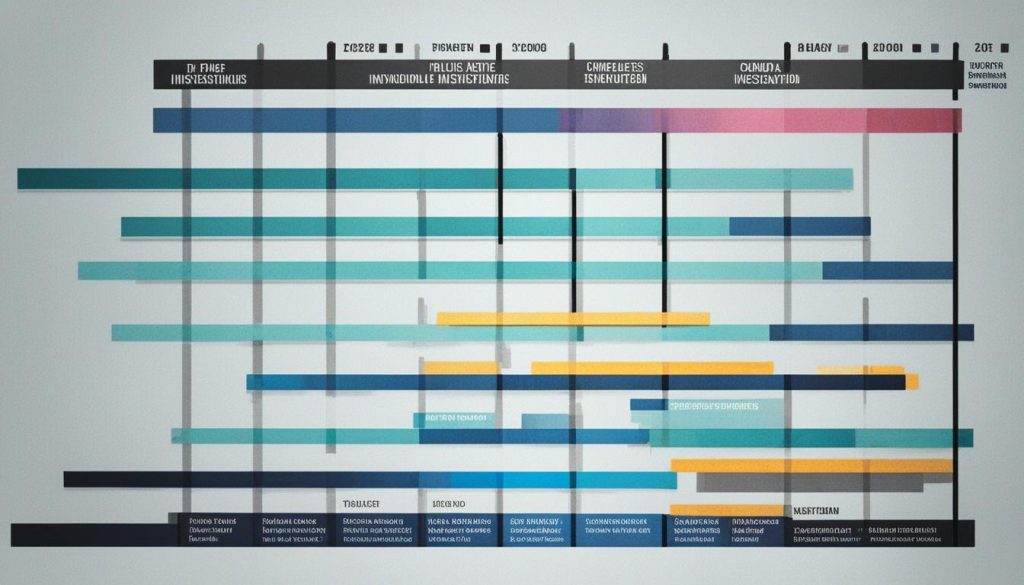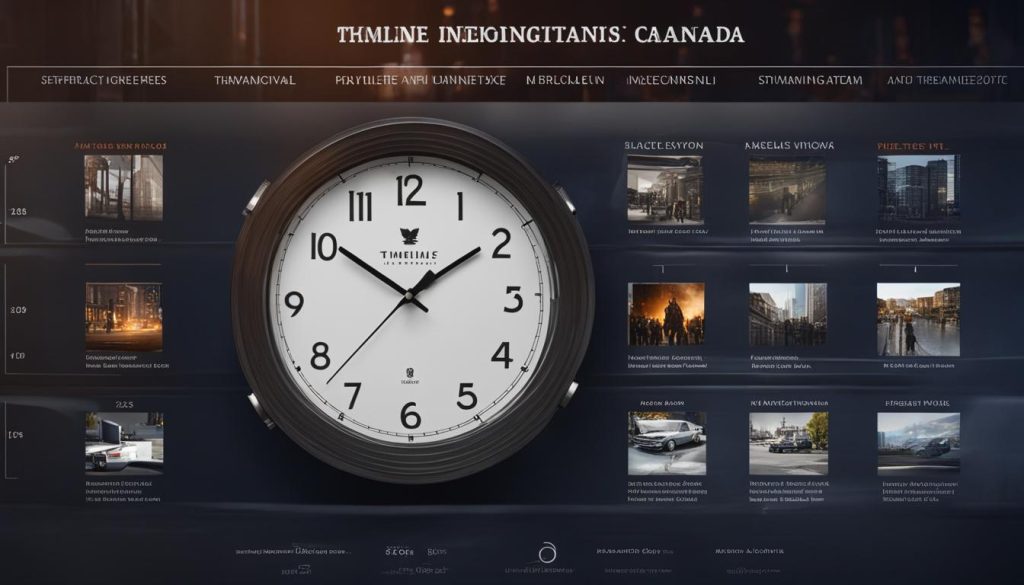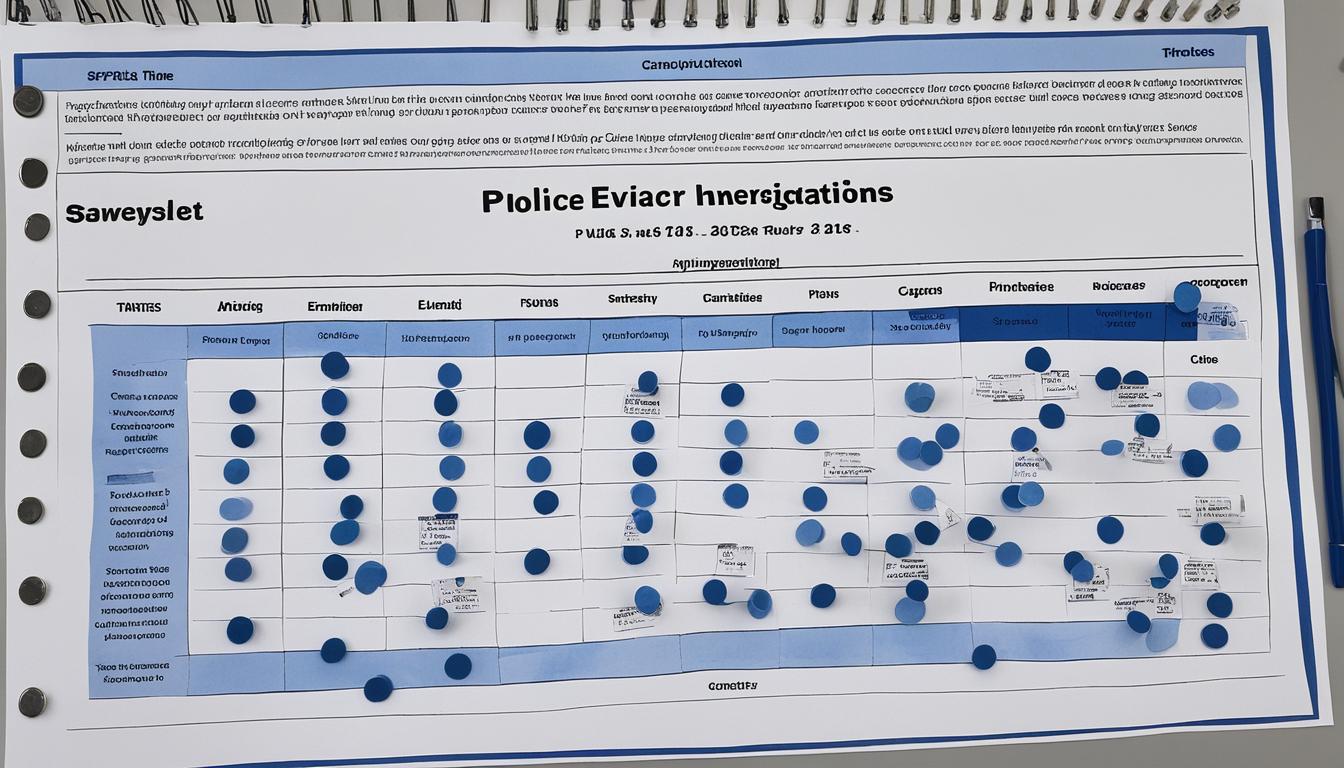Duration of Police Investigations in Canada
Did you know that the duration of police investigations in Canada can vary significantly? From swift DUI investigations that conclude on the same night to complex fraud cases that can take several years, the time it takes to complete a police investigation is influenced by various factors.
In this article, we will delve into the average time for police investigations in Canada and explore the factors that can impact the duration of these inquiries. Whether you have been involved in a legal matter or are simply curious about the investigative process, understanding the timeline of police investigations can provide valuable insights.
Key Takeaways:
- Police investigations in Canada can range from a few hours to several years, depending on the nature and complexity of the case.
- Factors such as the seriousness of the offense, the need for forensic analysis, the availability of witnesses, and the complexity of the case can influence the duration of an investigation.
- The Charter of Rights and Freedoms provides individuals with rights and protections during police investigations, including the right to remain silent and consult with a lawyer.
- Complaints against police officers and chiefs in Canada are handled through professional standards investigations and follow specific timelines and processes.
- The Office of the Independent Police Review Director (OIPRD) oversees the investigation of complaints against police officers and chiefs and ensures compliance with timelines and requirements.
Factors Influencing Investigation Duration
There are several factors that can impact the timeline of a police investigation in Canada.
- The seriousness of the offense: Investigations into more serious crimes tend to take longer than those into less serious offenses.
- The need for forensic analysis or expert opinions: Cases requiring extensive forensic analysis or expert opinions may have longer investigation timelines.
- The availability of witnesses: The speed of an investigation can be influenced by the availability of witnesses and their cooperation.
- The complexity of the case: Cases involving multiple individuals and a large amount of evidence can contribute to longer investigation durations.
These factors vary from case to case, and each investigation is unique. Understanding these influences can help provide insight into the duration of a police inquiry.

| Factors Influencing Investigation Duration | Impact |
|---|---|
| Seriousness of the offense | Investigations into more serious crimes tend to take longer than those into less serious offenses. |
| Need for forensic analysis or expert opinions | Cases requiring extensive forensic analysis or expert opinions may have longer investigation timelines. |
| Availability of witnesses | The speed of an investigation can be influenced by the availability of witnesses and their cooperation. |
| Complexity of the case | Cases involving multiple individuals and a large amount of evidence can contribute to longer investigation durations. |
Investigative Process and Tools
When it comes to police investigations in Canada, the process involves several steps that can vary depending on the nature of the case. This includes the gathering of evidence through various means, such as observations, witness interviews, review of security camera footage, and forensic examinations.
During an investigation, police officers have the authority to search persons and places, as well as seize potential evidence, under certain circumstances. However, it’s important to note that these powers are subject to the limitations outlined in the Charter of Rights and Freedoms, which provides individuals with protections against unreasonable search and seizure.
Another aspect of the investigative process is the ability of police officers to detain or arrest individuals. However, it’s essential to understand that individuals also have rights during a police investigation. They have the right to remain silent during interviews and can consult with a lawyer if they are unsure about their rights or obligations.
It’s worth noting that information obtained during an interview can be used against a suspect in court, but their silence cannot be used against them. This is an important safeguard to ensure that individuals are not compelled to incriminate themselves.
In summary, the investigative process in Canada involves gathering evidence through various means, respecting individuals’ rights and protections under the law. Let’s take a look at an example of how the investigative process may unfold in practice.

Case Study: Investigation of a Fraudulent Transaction
To illustrate the investigative process, let’s consider a case involving a fraudulent transaction. The investigation begins with the initial report of the incident, which prompts law enforcement to collect relevant information and evidence.
The investigating officers may start by interviewing the victim to gather details about the transaction, such as the suspect’s identity, the amount involved, and any supporting documents. They may also request surveillance footage from the location where the transaction took place to identify the suspect.
Forensic experts may be called in to analyze any electronic messages or documents related to the transaction, which can be a time-consuming process. These experts play a crucial role in determining the authenticity of the messages and gathering additional evidence, such as IP addresses or timestamps.
Throughout the investigation, the officers may conduct interviews with potential witnesses and individuals who may have knowledge of the fraudulent transaction. These interviews help to establish a timeline of events, corroborate the victim’s account, and identify any additional suspects.
Once all the necessary evidence has been gathered and analyzed, the investigating officers will compile a comprehensive case file. This file includes detailed reports, witness statements, forensic analysis findings, and any other relevant information that supports the charges against the suspect.
The case file is then presented to the appropriate prosecuting authority, who will assess the strength of the evidence and determine whether to proceed with criminal charges. The timeline for this decision can vary depending on factors such as the complexity of the case and the workload of the prosecuting authority.
Throughout the entire investigative process, police officers work diligently to ensure a thorough and fair investigation. Their goal is to gather sufficient evidence to support the charges and bring the suspect to justice.
| Steps in the Investigative Process | Duration |
|---|---|
| Gathering initial information | 1 day |
| Conducting victim interview | 1-2 days |
| Requesting surveillance footage | 1-3 days |
| Forensic analysis of electronic messages and documents | 1-2 weeks |
| Interviewing witnesses | 1-2 weeks |
| Compiling case file | 2-4 weeks |
| Prosecutor’s assessment and decision | 2-4 weeks |
The table above provides a rough estimate of the duration for each step in the investigative process for a fraudulent transaction case. It’s important to remember that these timelines can vary depending on the specific circumstances of each case.
Duration of Professional Standards Investigations
Complaints made against police officers in Canada are investigated through professional standards investigations. The duration of these investigations can vary depending on the nature and complexity of the complaint. Conduct complaints may be referred back to the police service for investigation, retained by the Office of the Independent Police Review Director (OIPRD) for investigation, or referred to another police service for investigation. The Police Services Act in Canada sets a timeline of six months for investigations to be completed, although more complex investigations may take longer. The OIPRD oversees these investigations and coordinates with police services to ensure compliance with timelines and requirements.
Investigative reports are prepared and include a summary of the complaint, statements from those involved, references to evidence, and analysis of whether there are reasonable grounds to substantiate misconduct. Complaints may have outcomes of unsubstantiated, substantiated less serious, or substantiated serious, and appropriate actions are taken based on these findings.
Investigation of Chiefs and Deputy Chiefs
Complaints made against municipal and regional police chiefs and deputy chiefs in Canada are handled differently. The Office of the Independent Police Review Director (OIPRD) screens these complaints and refers them to the appropriate police services board for review. Chiefs and deputy chiefs are employed directly by the boards, so the review process evaluates whether the alleged conduct may constitute a criminal offense or misconduct. Depending on the board’s determination, complaints may be referred back to the OIPRD for investigation or be subject to a hearing. The OIPRD oversees these investigations and provides reports on the substantiation of complaints. The hearing process involves the chief or deputy chief and may result in penalties or further actions. Complaints regarding the conduct of the Ontario Provincial Police (OPP) Commissioner and deputy commissioners follow a similar process, but the OIPRD does not conduct investigations or oversight in these cases.
Regarding complaints against other chiefs and deputy chiefs in Canada, the review process may vary slightly depending on the specific police services board conducting the investigation. However, the overall goal remains to ensure accountability and integrity within law enforcement leadership.
Through a transparent and fair review process, the investigation of chiefs and deputy chiefs enables the public to voice concerns and hold individuals in positions of authority accountable for their actions. This reinforces trust in the Canadian law enforcement system and promotes confidence in the pursuit of justice.
Policy and Service Complaints
As part of its responsibilities, the Office of the Independent Police Review Director (OIPRD) in Canada handles policy and service complaints. These complaints focus on the policies and services provided by police organizations and are directed to the relevant police chief or the Ontario Provincial Police (OPP) Commissioner for a response.
Upon receiving a complaint, the chief or Commissioner has a maximum of 60 days to provide a written report outlining their decision and the reasons behind it. While the OIPRD oversees these complaints, it does not conduct investigations into them. Instead, the focus is on determining whether the complaint is substantiated or unsubstantiated, leading to appropriate actions being taken accordingly.
In the review process, police services boards play a crucial role in assessing complaints against chiefs and deputy chiefs, ensuring accountability within the command structure. Meanwhile, the OIPRD’s main focus is on substantiating and managing complaints related to police conduct, fostering transparency and maintaining public trust in law enforcement agencies.
- Canada Arrest Protocol: What Police Say Upon Arrest - June 12, 2025
- Can Police Disclose Who Reported You? Find Out Here - June 6, 2025
- 2025 Window Rebates Ontario: How to Save Money While Replacing Windows and Doors - April 24, 2025




















Post Comment